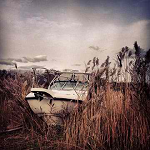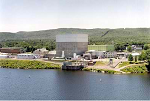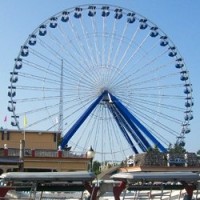The 135th Carnival of Nuclear Bloggers at ANS Nuclear Cafe
Things Worse Than Nuclear Power: Terror
Fear of nuclear power, radiation, and nuclear materials proliferation is a red herring for real terrorism dangers.
Atomic Insights: Power cheaper than coal - thorium AND uranium make it possible
Bob Hargraves is a professor with a good facility for numbers, and a talent for clear explanations. He demonstrates that there is little hope of driving down the total cost of producing energy from unreliable weather-dependent sources, because the capital investment in those sources will often be idle and not producing any revenue. He persuasively demonstrates that well-designed and built nuclear plants whose operators successfully achieve capacity factors in the range of 85-90% are already cost competitive with coal. He also shows how nuclear plant designers can apply well-understood techniques to achieve even better economic performance.
 ANS Nuclear Cafe: Timing and Framing: How to address nuclear and climate change
ANS Nuclear Cafe: Timing and Framing: How to address nuclear and climate change
In the wake of superstorm Sandy, Suzy Hobbs Baker argues that "right now is the perfect time to provide a new framework for supporting nuclear as a solution to climate change."
The Nuclear Diner: US and Russia - Reactor Wars
It is fascinating that the US and Russia are now competing in the global field of nuclear reactor construction. It is not only the reactor designers, but the politicians that are weighing in and supporting the designer from their nation. It has the sense of being competitive and a bit like a school yard fight. Susan Voss has been studying and analyzing the Russian nuclear program for many years and is interested in how they are growing and changing to be more competitive on the international market. The competitive field she focuses on in this post is the Czech Republic. The Czech government put out a request for bids and three companies put in proposals: Westinghouse/Toshiba representing the US and Japan, Rosatom representing Russia, and AREVA representing France. Interestingly enough, AREVA was tossed out of the competition for not meeting "crucial requirements." [Reuters]
Next Big Future: Japan likely heading for a pro-nuclear LDP win in national elections this week
In this Sunday, Dec 16th election, Japan is expected to be electing the most pro-nuclear of its major political parties, the LDP, to a return to government.
Next Big Future: China starts new nuclear construction and makes deals with Russia
Construction of three new Chinese reactors has begun, since the country's announcement in October that it would approve only a 'small number' of nuclear projects in each of the coming five years. First concrete has now been poured for Fuqing unit 4 in Fujian province and Yangjiang unit 4 in Guangdong province - both 1080 MWe CPR-1000 units. In addition, construction of the Shandong Shidaowan HTR-PM project - a demonstration high-temperature gas-cooled reactor - has also started in Shandong province.
The Hiroshima Syndrome: Latest Chernobyl cancer study contains numerous problems
A November 8 report claiming increased leukemia in Chernobyl clean-up workers is fraught with problems. Several have been exposed by a recent Ukrainian expert group. In addition, the report's listing of supportive references with respect to its claim of a CLL/LLR relationship being "not clear" is materially incorrect. Further, the report fails to make a comparison between typical non-irradiated leukemia statistics and those gleaned from Chernobyl worker records. It appears the report looks at Chernobyl in isolation from all necessarily-related statistics: a critical omission that can only have been intentional.
The Hiroshima Syndrome: A phantom conflict of interest in Japan (December 10)
The international press reports that a "potential conflict of interest" was "buried" in last year's 600-page congressional investigation into the Fukushima accident. The ICRP members in Japan are taking umbrage with the allegation made by Dr. Hisako Sukiyama, one of the members of the Diet's Fukushima Accident Investigative Committee. What's more important - a potentiality based on thin evidence, or the actual professional record of those involved?
Dr. Robert Hayes: Nuclear fuel cycle, nuclear revival, and the Permian Basin
Dr. Hayes on a nuclear renaissance going on in the Permian Basin -- in uranium enrichment and associated processes [that's in West Texas and Southeast New Mexico, folks]
 Yes Vermont Yankee: The very latest lawsuit: opponents will probably lose
Yes Vermont Yankee: The very latest lawsuit: opponents will probably lose
To keep operating, Vermont Yankee nuclear power plant needs a Certificate of Public Good from the Vermont Public Service Board (PSB). In this post, Meredith Angwin describes the latest opponent tactic of bringing suit in Vermont Supreme Court to deny the certificate. The certificate is already being judged in hearings before the PSB and under litigation in Federal Court.
The Certificate is a political hot potato for the PSB, and they seem to have encouraged the opponent to sue in another court. Quick, throw it to another court. Don't get caught having to rule on it!
ANS Nuclear Cafe: Vermont weather gets colder -- Vermont Yankee politics continue hot
Howard Shaffer reports the latest news concerning the politics of the Vermont Yankee nuclear power plant -- a Vermont Public Service Board ruling, a supreme court lawsuit, a public radio debate, a protestors' trial, and more
The Neutron Economy: Spent nuclear fuel disposal is not a "subsidy"
Contrary to the oft-heard canard that the disposal of spent nuclear fuel constitutes a "subsidy" to the U.S. nuclear industry, $22 billion later the nuclear industry is one of the few actually required to fully internalize the costs of waste management. Steve Skutnik explores the details.
Thanks to all contributors - and to all of our readers, remember to spread the word about the Carnival of Nuclear Bloggers via Facebook and Twitter.


